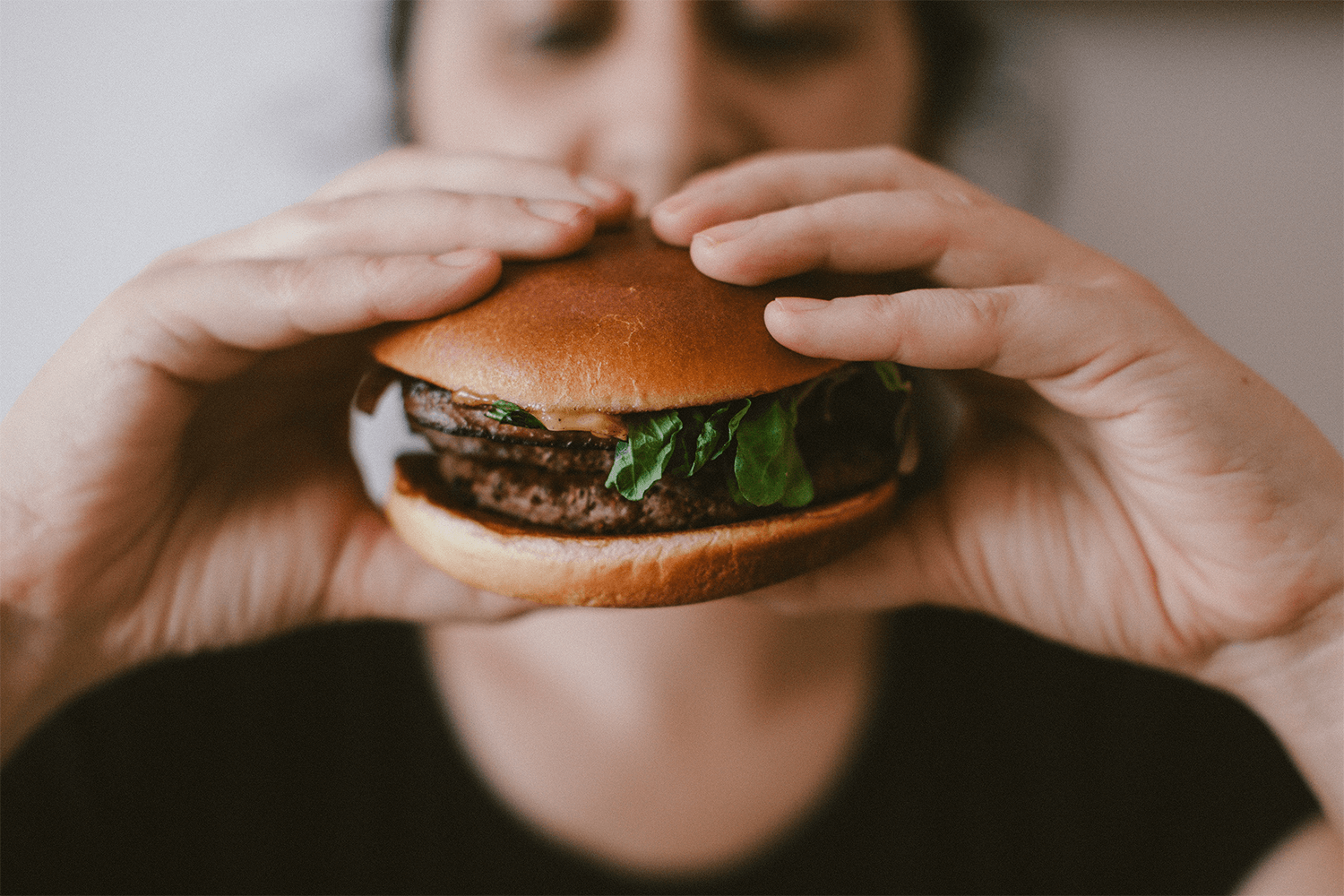Written by Ashley Kane,
Brightside Health
7 Minute Read

Medically reviewed by:
Erin O'Callaghan, PHD
Director of Therapy
10 Minute Read

Being hungry is a normal signal from your body saying that it needs nutrients. Usually, when you’re hungry, your body gives you signs like your stomach “growling.” The majority of people can go a couple of hours between meals before they start to feel hungry, but for some, hunger is a more constant feeling.
There are a couple of different reasons this could be happening, some more serious than others. One particularly serious cause is having an underlying mental health condition such as depression or anxiety. In depression, specifically, appetite and eating habit changes can occur as a symptom. Additionally, sometimes people cope with depression and/or anxiety through overeating — it helps them avoid the negative emotions. When they eat foods they enjoy, they get positive feelings, but that then subsides and they are back to feeling anxious or depressed.
Here’s what you need to know about an increase in your appetite, and when it’s time to seek some help for it.
Want to speak 1:1 with an expert about your anxiety & depression?
How Do I Know If I Have An Increased Appetite?
Sometimes it can be difficult to tell if you’ve been feeling hungrier than usual. A good way to figure this out is to track your food intake in a journal. You can do this by logging what you eat and at what time each day. If you get to the end of the week and see a subtle change in your usual diet, it might be time to consider the possibility that something is going on with your body.
Causes of Increased Appetite
Here are some of the most common causes for increased appetite. Some of these causes are medical conditions that should be treated by a doctor, while others are lifestyle choices that can be more easily changed. If you feel like your appetite has increased dramatically, make sure to reach out to a professional who can get to the root of it.
- Stress can sometimes cause your appetite to increase. When your cortisol increases, so does your craving for food. So if you frequently feel stressed, you might be tempted to frequently eat. Although sometimes people who feel a lot of stress forget to eat altogether.
- Depression is caused by an imbalance with the chemicals in your brain. Sometimes when these chemicals fluctuate, it can impact things like your energy level, digestion, and appetite — for some, they have an increased appetite, and for others, they completely lose their appetite. Depression also affects your mood, behavior, and sleep patterns, too.
- Avoidance is one explanation for eating more than usual, and it doesn’t even have to involve the actual physical feeling of being hungry. Overeating can be a tool that people use to avoid negative emotions. They “feed themselves” the positive mood or fleeting feelings of joy they may get from eating sweets or other foods that bring them happiness.
- Women experiencing premenstrual symptoms can sometimes feel an increase in appetite. Typically, calorie intake is slightly higher for women in the luteal phase of their cycles. Progesterone, which increases after ovulation, is thought to affect hunger.
- Pregnant women can also feel an increase in appetite during gestation. This is because the baby is growing, and as it grows, it needs more nourishment to survive. This is usually when the mother gains a bit of weight to meet the needs of the baby.
- Bulimia is another reason for increased appetite. This type of eating disorder involves binge eating and purging. During this, your body gets used to living on a high carb diet and releases a lot of insulin to use the food. When the food is purged, your blood sugar drops and causes intense hunger pains.
- Hyperthyroidism is a condition which affects your ability to regulate your metabolism. People with this condition often burn more energy while they are resting, which means your body needs more food to survive and maintain itself.
- Diabetes is another condition that is extremely common. People with diabetes struggle to regulate their blood sugar level, causing hunger to occur at abnormal times. The other symptoms of diabetes are increased thirst, fatigue, and frequent urination.
- Poor sleep — sleeping is extremely important for your body’s health. It’s required for the proper functioning of your brain and can help reduce your risk of chronic illness. Sleep affects your appetite because it regulates ghrelin, which is an appetite-stimulating hormone. If you lack sleep, you’ll have higher levels of ghrelin, causing you to feel hungrier.
- Poor hydration could be another reason your appetite has increased. Water is filling and helps to reduce your appetite when you drink it before a meal. Sometimes thirst is mistaken for hunger, leading to overeating.
- Eating while you’re distracted can lead to an increase in your overall appetite. People who eat while they’re doing other things are not aware of how much they are eating. This leads to eating too much food, causing your body to think that you need more food throughout the day.
- Drinking too much alcohol has appetite-stimulating effects. Alcohol can inhibit the hormones that reduce your appetite, like leptin. People who drink alcohol often consume 10% more calories than people who don’t.
When To Seek Professional Help
Significant increases in appetite should be addressed with your medical provider. Sometimes changes in appetite are accompanied by other symptoms, which could mean that you have an underlying condition, whether that’s a physical condition like a hormone imbalance, or a mental health condition like depression or anxiety..
When you talk to your provider, they will want to do an exam and ask you some questions about your appetite. They might ask things like:
- What is your exercise routine?
- What medications do you currently take?
- Are you currently on a diet?
- Do you find it’s been hard to get motivated for the day?
- Have you been worrying a lot about anything in particular?
- Have you been having more bad days than good in the past few weeks?
Depending on what your other symptoms are, your provider may want to run some tests like lab work to figure out if you have any imbalances.
Treatment For Increased Appetite
Depending on the cause for your increased appetite, there are a number of solutions that you can pursue. Before taking anything over the counter, make sure you clear it with a provider first. They will be able to suggest the best treatment plan for you.
If you already take medications, your change in appetite could be caused by them. Some doctors might suggest alternative medications or change your dosage to deal with your increased appetite.
People who experience an increase in appetite due to anxiety, depression, or stress should look into seeking help from a mental health provider who can offer medication to help with symptoms. Additionally, if mental health is the source of your appetite changes, you may benefit from speaking to a licensed therapist.
How Brightside Can Help
Brightside is a telehealth provider that specializes in anxiety and depression treatment. We offer personalized plans with evidence-based therapy and medication options that can help with symptoms and conditions related to increased appetite.
With Brightside, you receive ongoing online care from hand-selected providers who are experts in treating anxiety and depression. Since anxiety comes in many forms, we make sure that we specialize in the full-spectrum of related conditions like PTSD, social anxiety, and phobias.
Brightside has affordable plans to help you start feeling better right away. On average, 85% of members feel better in 12 weeks after starting treatment. The membership includes your initial evaluation, regular check-ins with your psychiatric provider, unlimited daily messaging, and weekly video sessions with your therapist.
The Takeaway
If you’re feeling an increase in your appetite, you don’t have to just sit and wonder where it’s coming from. There are ways to help you understand the root cause of your hunger, and it starts by seeking a little help.
Start with Brightside today to get started with treatment.
Sources:
14 Reasons Why You’re Always Hungry – Healthline
Increased Appetite: Symptoms, Signs, Causes & Treatment – MedicineNet
Why am I always hungry? 17 reasons for hunger even after eating – Medical News Today














